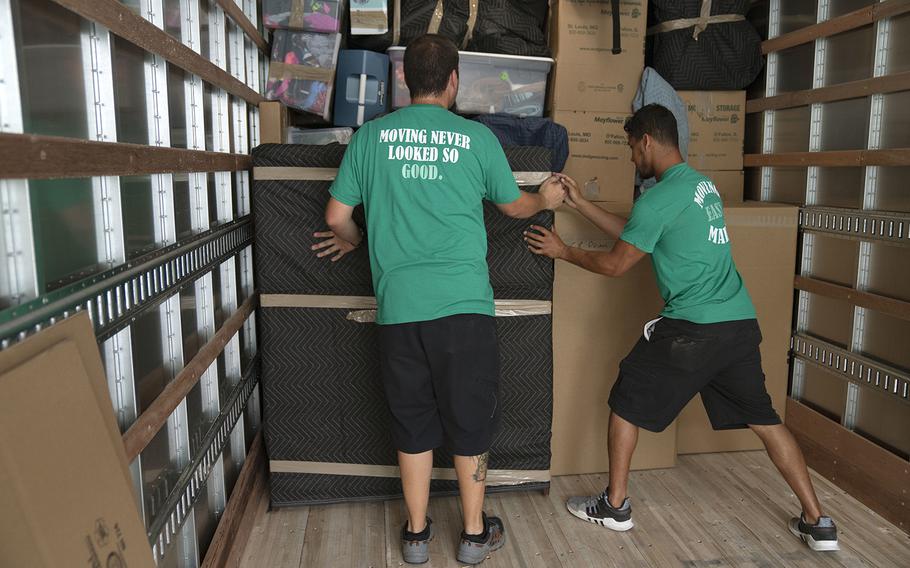
Contracted personnel perform an accountability assessment and pack items belonging to a U.S. soldier before a move to a different state June 12, 2019. (Stephenie Wade/U.S. Transportation Command)
Stars and Stripes is making stories on the coronavirus pandemic available free of charge. See other free reports here. Sign up for our daily coronavirus newsletter here. Please support our journalism with a subscription.
WASHINGTON — More than 30,000 military families are expected to start the moving process between now and the end of June despite a Defense Department directive prohibiting such moves during the coronavirus pandemic, defense officials said Wednesday.
“So those are the families who have been approved or authorized to move, if conditions allow, will proceed with their [permanent change of station],” Rick Marsh, director of the Defense Personal Property Program for U.S. Transportation Command, said Wednesday during a Pentagon news conference on military moves during the pandemic.
The most recent stop-movement order issued April 20 by Defense Secretary Mark Esper ends June 30, but it allows priority personnel to receive a waiver to the policy through their chain of command so they can move to their next duty station during the halt.
TRANSCOM is tracking these families in their shipment system and they are in various stages of the process to have their household goods picked up sometime before June 30, Marsh said.
So far, more than 12,500 families have moved since early March when travel restrictions were first put in place, Marsh said. These moves were 30% of the volume that they typically have during that time, he said.
In a normal year, about 400,000 service members, DOD civilians and their families are moved, with 40% of moves happening between May 15 and August 31, according to the Pentagon.
Marsh said they expect moves to continue through the fall and winter due to the demand, and it was possible that more families could be added to their queue before June 30. Shipment and delivery of the household goods are conditions based, including whether families feel it’s not yet safe at the new location, he said.
TRANSCOM also announced Wednesday that companies helping military members move must have their personnel follow more safety measures during the packing and shipment of household goods. Families will be emailed details about these safety protocols during the moving process, according to Marsh.
“Because the relocation process is intrusive with moving personnel working inside homes along DOD personnel and their families, DOD has directed that industry personnel adhere to Centers for Disease Control [and Prevention] health protection protocols,” Marsh said.
Movers must wear face coverings while in the home, clean frequently touched surfaces and sanitize their hands. There will also be fewer movers working at the residence in order to ensure social distancing requirements, according to Marsh. Service members are also asked to limit family members in the home or restrict them to one room in the home during the packing and moving process, according to a TRANSCOM document on the new safety measures.
Companies also must certify their personnel have been screened for symptoms according to CDC guidelines and present documentation to the family when they arrive to the home, Marsh said. Families are also asked to comply with these safety measures and reschedule moves if they are sick or are in self quarantine.
Service members can question movers about whether they are following the safety measures and can deny them from entering their home. They can also stop the move entirely if they feel the movers are “compromising their safety,” according to a TRANSCOM statement. The service member would work with their local transportation office and chain of command to reschedule their move.
“Families are empowered to make decisions, they're not alone. A duty representative will contact every DOD member during every move — in person or virtually — to ensure protocols are being followed,” Marsh said.